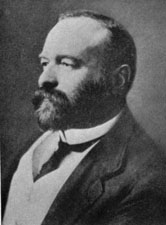| This article needs additional citations for verification. Please help improve this article by adding citations to reliable sources. Unsourced material may be challenged and removed. Find sources: "Franklin Henry Giddings" – news · newspapers · books · scholar · JSTOR (January 2017) (Learn how and when to remove this message) |

Franklin Henry Giddings (March 23, 1855 – June 11, 1931) was an American sociologist, economist, and journalist.
Biography
Giddings was born at Sherman, Connecticut. His father was an Evangelical minister. He graduated with a degree from Union College in 1877. For ten years he wrote items for the Springfield, Massachusetts Republican and the Daily Union.
From 1888 to 1894, he was lecturer in political science at Bryn Mawr College. From 1891 until his death, he was on the faculty of Columbia University. He became professor of sociology at Columbia University in 1894. From 1892 to 1905 he was a vice president of the American Academy of Political and Social Science.
His most significant contribution is the concept of the consciousness of kind, which is a state of mind whereby one conscious being recognizes another as being of like mind. All human motives organize themselves around consciousness of kind as a determining principle. Association leads to conflict which leads to consciousness of kind through communication, imitation, toleration, co-operation, and alliance. Eventually the group achieves a self-consciousness of its own (as opposed to individual self-consciousness) from which traditions and social values can arise.
He also coined the term collective behavior.
In 1914 he became one of the inaugural Fellows of the American Statistical Association.
Giddings died in Scarsdale, New York.
Works
- The Modern Distributive Process (in collaboration with J.B. Clark, 1888).
- The Theory of Sociology (1894).
- The Principles of Sociology (1896).
- The Theory of Socialization (1897).
- Elements of Sociology (1898).
- Democracy and Empire (1900).
- Inductive Sociology (1901).
- Descriptive and Historical Sociology (1906).
- The Responsible State (1918).
References
- Northcott, Clarence H. (1918). "The Sociological Theories of Franklin H. Giddings". American Journal of Sociology. 24 (1): 1–23. ISSN 0002-9602.
- Hankins, F. H. (1931). "Franklin Henry Giddins, 1855-1931: Some Aspects of His Sociological Theory". American Journal of Sociology. 37 (3): 349–367. ISSN 0002-9602.
- ^ "Franklin Henry Giddings, 1855-1931". American Journal of Sociology. 37 (2): 273–273. 1931. ISSN 0002-9602.
- ^ Gillin, John Lewis (1926). "Masters of Social Science: Franklin Henry Giddings". Social Forces. 5 (2): 197–214. doi:10.2307/3004767. ISSN 0037-7732.
- List of ASA Fellows Archived 2016-06-16 at the Wayback Machine, retrieved 2016-07-16.
- Hall, Arnold B. (1919). "Review of The Responsible State". American Journal of Sociology. 24 (4): 461–462. ISSN 0002-9602.
External links
| This article's use of external links may not follow Misplaced Pages's policies or guidelines. Please improve this article by removing excessive or inappropriate external links, and converting useful links where appropriate into footnote references. (January 2016) (Learn how and when to remove this message) |
- Works by Franklin H. Giddings at Project Gutenberg
- Works by or about Franklin Henry Giddings at the Internet Archive
- Works by Franklyn Henry Giddings, at Hathi Trust
- Interview on the economic aspects of the War by Edward Marshall, New York Times. Published January 9, 1915
- Franklin Henry Giddings at Find a Grave

- Franklin Henry Giddings Collection. General Collection, Beinecke Rare Book and Manuscript Library, Yale University.
This biography of an American sociologist is a stub. You can help Misplaced Pages by expanding it. |
- People from Sherman, Connecticut
- American political writers
- American male non-fiction writers
- American sociologists
- Fellows of the American Statistical Association
- Presidents of the American Sociological Association
- Economists from New York (state)
- 1855 births
- 1931 deaths
- Union College (New York) alumni
- Mathematicians from New York (state)
- Economists from Connecticut
- American sociologist stubs